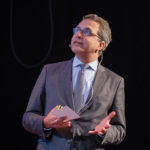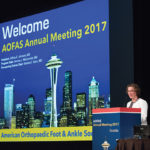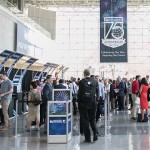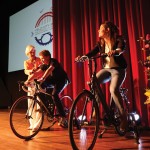More than 10,500 professionals in the radiation oncology industry — medical physicists, dosimetrists, radiation therapists, radiation oncology nurses and nurse practitioners, and others — came out for the conference, themed “Patients: Hope, Guide, Heal,” with a focus on patient-centric care and physicians’ role in improving the safety and quality of care.
CHALLENGES
When Convene first checked in with Michele Donohue, ASTRO’s director of meetings, she said that the organization’s biggest challenges included carving out enough time for conference attendees to network in the expo hall while not overwhelming their schedules with scientific and educational content. (Read our Pre Con profile of ASTRO 2013 at convn.org/astro-precon.) “We offered several 30-minute breaks throughout the course of the meeting,” Donohue said, “that allowed for more dedicated time in the exhibit hall.” Based on a study ASTRO conducted, the lengthened breaks, originally 15 minutes, increased late-afternoon traffic.
To accommodate the longer breaks, ASTRO shortened educational sessions from 90 minutes to 75, which seemed to work well, Donohue said, although, some attendees complained about not having enough time for Q&A. “For next year’s Annual Meeting, we plan to improve our speaker communication and remind them of the shorter session length, and to allow 10 to 15 minutes at the end of the sessions for questions.”
INITIATIVES
New technology and innovation are staples at ASTRO’s Annual Meeting — including, at the 2013 conference, amplifying its rich content using the event app. “In an effort to promote and encourage usage of our event app,” Donohue said, “we made our printed program available only upon request, and we included information about the app on signage and handouts in registration, session rooms, [and] information booths.”
In addition, ASTRO wanted to use more eco-friendly, tech-savvy signage, and so transitioned that from traditional to digital. “We were able to address last-minute session changes [via signage] immediately and seamlessly,” Donohue said. “In addition to including session content, we also included our Twitter feed and encouraged attendees to tweet about the meeting.”
ASTRO also changed its webcast format after consulting with other medical meeting planners who had low live-webcast attendance. Instead of live-casting sessions, the organization made the content available within 24 hours after an event concluded, allowing attendees who missed sessions live to view them at their convenience.
Donohue is already thinking about ASTRO 2014, which will be held at the Moscone Center in San Francisco on Sept. 14-17. The poster-viewing session, always the meeting’s biggest networking event, will be even better. Donohue said the plan is to extend the reception by 15 minutes, “to allow for more poster viewing and networking with colleagues.” ASTRO also plans to improve the conference app by incorporating surveys and CME certificate processes, and to add unopposed clinical trials to the program, Donohue said, “allowing there to be two unopposed scientific sessions that highlight the best science of the meeting.”
Convene’s Pre-Con/Post-Con series asks meeting planners about their challenges and how they intend to address them (Pre-Con), and then circles back around after the meeting has occurred (Post-Con) to see how well they worked out.




